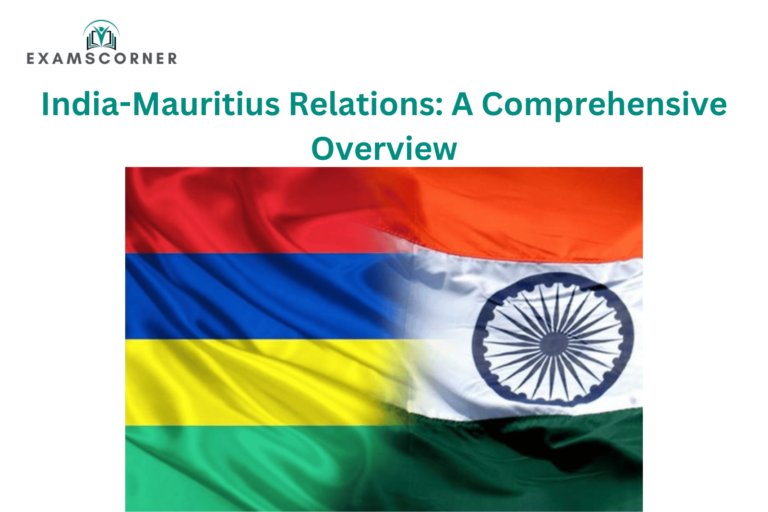India–Mauritius relations encompass the historical, political, economic, military, social, and cultural ties between the Republic of India and the Republic of Mauritius. Diplomatic relations were formally established in 1948, with connections tracing back to the colonial era under successive Dutch, French, and British occupations.
After Mauritius gained independence on March 12, 1968, its first Prime Minister, Sir Seewoosagur Ramgoolam, emphasized the importance of India in Mauritius’ foreign policy. This article delves into the bilateral and diplomatic ties between India and Mauritius, highlighting the benefits for both nations over the years.
India-Mauritius Relations Latest: President Droupadi Murmu’s Visit (March 2024)
Indian President Droupadi Murmu embarked on her first state visit to Mauritius in March 2024. During her visit:
- She addressed a gathering at the Mahatma Gandhi Institute (MGI), Moka, Mauritius.
- The University of Mauritius conferred an Honoris Causa Degree of Doctor of Civil Law upon President Murmu.
- She met with the President and Prime Minister of Mauritius, strengthening bilateral ties.
- A special provision was announced for 7th-generation Indian-origin Mauritians to be eligible for Overseas Citizenship of India (OCI).
Historical Background of India-Mauritius Relations
- Indian Migration: From the 1820s, Indian workers migrated to Mauritius for work on sugar plantations. Following the abolition of slavery in 1834, large numbers of Indian indentured laborers were brought to Mauritius.
- Mahatma Gandhi’s Visit: Gandhi’s brief stopover from October 29 to November 15, 1901, en route to India from South Africa, remains a significant historical event.
- Manilal Doctor: Suggested by Gandhi, Manilal Doctor arrived in 1907 to help organize the Mauritian Indian community for their political and social rights.
- Aapravasi Day: Celebrated on November 2, marking the arrival of the first Indian indentured laborers in 1834.
- National Day: Mauritius observes its National Day on March 12, coinciding with the launch of Gandhi’s Dandi Salt March in 1930.
Bilateral & Diplomatic Relations
High-Level Visits
High-level visits underscore the strong relationship between the two nations. The historical and cultural ties have fostered cordial relations, further reinforced by agreements and MoUs, including:
- Double Taxation Avoidance Convention (1982)
- Bilateral Investment Promotion and Protection Agreement (1998)
- MoU on Air Services (2005)
- Agreement on Cooperation in Information Technology (2000)
- MoU on Biotechnology Cooperation (2002)
- MoU on Cooperation against Terrorism (2005)
- Agreement on the Transfer of Sentenced Persons (2005)
- Educational Exchange Programme (2012)
- MoU on Textiles (2012)
International Cooperation
Both countries are members of international organizations such as:
- World Trade Organisation (WTO)
- Commonwealth of Nations
- United Nations Organisation (UN)
Political Relations
- Key Visits: Mauritius Prime Minister Pravind Jugnauth attended Indian Prime Minister Narendra Modi’s oath-taking ceremony in 2019. In 2014, then-Prime Minister Navinchandra Ramgoolam attended Modi’s swearing-in ceremony.
- World Hindi Conference: The 11th WHC was held in Mauritius in August 2018, focusing on “Global Hindi and Indian Culture.”
Commercial and Trade Ties
- Trade: India has been one of Mauritius’ largest trading partners since 2007.
- Petroleum Supply: A three-year agreement between Mangalore Refinery and Petrochemicals Ltd (MRPL) and Mauritius’ State Trading Corporation was renewed in 2013.
Cultural Relations
- Indira Gandhi Centre for Indian Culture (IGCIC): Located in Phoenix, it promotes Indian cultural activities.
- India Week (2018): Celebrated Mauritius’ 50th independence anniversary with various cultural programs.
- Yoga & AYUSH: Traditional Indian health systems are widely popular in Mauritius.
- Institutions: The Mahatma Gandhi Institute and Rabindranath Tagore Institute were established to promote Indian culture and education.
Educational Relations
- Scholarships: Mauritius is the largest beneficiary of Indian Technical and Economic Cooperation (ITEC) scholarships, with 97 ICCR scholarships offered annually.
- Student Enrollment: Around 200 Mauritian students enroll in Indian universities annually on a self-financed basis.
Indians in Mauritius
- Population: As of 2019, about 10,000 Indian nationals reside in Mauritius.
- Visa-Free Regime: Indian tourists can visit Mauritius visa-free for up to 30 days.
- OCI Card Holders: Approximately 8,500 Mauritians hold OCI cards, enabling them to live and work in India indefinitely.
Conclusion
India and Mauritius share a deep-rooted relationship shaped by history, culture, and mutual cooperation. Their collaboration spans various domains, including trade, culture, education, and diplomacy. As both nations continue to strengthen their ties, the India-Mauritius relationship stands as a testament to shared heritage and a promising future.



